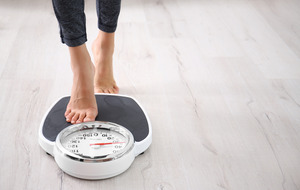January 26, 2023

Weight and sleep apnea are very closely linked. In fact, adults who are considered obese are nearly twice as likely to suffer from obstructive sleep apnea (OSA). But what is the exact nature of the relationship between weight gain and sleep-disordered breathing? Does one cause the other? Here’s what you need to know to improve the quality of your slumber and keep your body healthy.
How Weight and Sleep Apnea are Connected
Sleep apnea is a condition where you repeatedly experience pauses in your breathing while you’re asleep. OSA is the most common form of sleep apnea, and it can occur when your airway is blocked in some way.
People who are overweight often have a higher risk for OSA due to excess fat deposits in the neck. These deposits can collapse and block your airway, cutting off the flow of oxygen and forcing your body to awaken to resume breathing.
But the connection doesn’t just go one way; in many cases, OSA can actually cause you to gain weight. This is because the lack of sleep causes your body to produce more ghrelin, which is the hormone that makes you feel hungry. As a result, you may experience cravings for high-calorie foods, making you more likely to overeat. Additionally, OSA typically leaves you feeling exhausted during the day, meaning you’re probably getting less of the exercise needed to maintain a healthy body weight.
What Can You Do About Sleep Apnea and Weight Gain?
Since sleep apnea and weight gain are often related, treating one can help address the other. As such, weight loss is often an important part of sleep apnea treatment. Changing your diet and exercising more often can help reduce weight; your general doctor might make additional suggestions based on your situation.
Of course, while you’re trying to lose weight, you’ll also want to take steps to get your sleep apnea under control so that you can get a good night’s rest. CPAP therapy is the most common sleep apnea treatment, but if you’re CPAP intolerant, you can ask your sleep dentist about getting an oral appliance instead.
The oral appliances used to treat sleep apnea move the jaw slightly forward to keep the airway open, making it less likely that breathing will be interrupted. Your oral appliance will be customized so that it fits perfectly on your teeth, making it a more comfortable and convenient alternative to a CPAP machine.
For both sleep apnea and excessive weight, it’s better to have the problem treated as early as possible before irreparable harm is done. Be proactive in getting your weight under control and finding a solution for your sleep-disordered breathing.
About the Author
Dr. Ivan Paskalev has been a dentist for over two full decades and has practiced in Bulgaria, the United Kingdom, and the United States. He is currently pursuing the American Academy of Dental Sleep Medicine’s Mastery Program. At Better Sleep Eugene, he can help patients improve their sleep with oral appliance therapy. If you have concerns about sleep apnea, you can schedule a consultation with Dr. Paskalev by visiting his website or calling (541) 246-8284.

